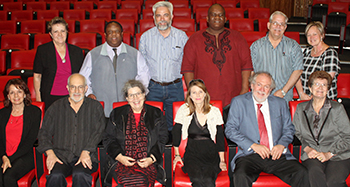Latest News Archive
Please select Category, Year, and then Month to display items
01 January 2020
|
Story Eugene Seegers
|
Photo Kaleidoscope Studios | Sonia Small
 Dr Maria Madiope took over the reins of the UFS South Campus at the beginning of January 2020.
Dr Maria Madiope took over the reins of the UFS South Campus at the beginning of January 2020.
The Council of the University of the Free State (UFS) approved the appointment of Dr Maria ‘Marinkie’ Madiope as Principal of the South Campus for Open Distance Learning (ODL) during a meeting held on 20 September 2019. Dr Madiope took over the reins of the UFS South Campus at the beginning of January 2020.
Educator at heart
Educating and empowering others are key aspects of Dr Madiope's life. She has served as the Director for University Teaching and Learning at Unisa since 2015 and takes her role incredibly seriously, achieving a transformative curriculum at the colleges under her care since her appointment.
Dr Madiope holds a PhD in Education from Unisa, with a specialisation in Didactics; her next two degrees where completed at the then RAU, which is today known as the University of Johannesburg: a BEd in 1999, followed by an MEd in 2001, both specialising in Computer-based Instruction. She previously obtained her BA Ed in 1985 and a BEd in 1988 from the University of the North. Her initial training as a teacher was from the Hebron College of Education from 1980-81.
Dr Madiope is also the editor of the only journal in ODL, Progressio, since 2016. Her expertise in E-learning is another of her strong points. Together with her team, Dr Madiope designed and developed the first online course in Curriculum Transformation, which is being piloted at Unisa. Her work has been rewarded with awards such as the Unisa Gender Activism: Advocacy and Promotion of Women’s Rights 2013, Unisa Woman of the Year 2013, and Unisa Best Performer 2013.
Dr Madiope brings with her a wealth of experience to UFS and her vision is to increase access to a wider base of learners with potentially having more African learners enrolled. The first point of call would be to have more learners coming from Lesotho and then the rest of the SADEC region, having the UFS become a leading distance-learning university. One of the key projects that Dr Madiope wishes to tackle is early childhood development. “I believe in educating educators to ensure that they are best equipped to provide the latest and relevant Early childhood and development practices that are on par with the rest of the world,” she says.
Community leader
In addition to being an experienced educator and administrator, Dr Madiope is instrumental in community projects that lie close to her heart. Whether it is large-scale advocacy for women’s rights or her personal involvement in the supply of sanitary towels for schoolgirls as part of a programme to empower the girl child through exposing them to options, it is humbling to watch her compassion in action.
She further intends to strengthen the relationship of the university with TVET Colleges and community colleges by providing mutually beneficial programmes that will up-skill those colleagues by giving them an opportunity to work with experienced UFS staff members. She says, “Reaching out to colleagues in TVET and Community colleges will offer them the opportunity to advance their lecturing and learning programmes, which will only lead to benefiting their learners and South Africa as a whole.”
Special Edition of the Journal for New Generation Sciences launched at UFS
2016-10-26

Participants of the round-table discussion
at the launch of the Journal for New Generation
Sciences during the UFS Faculty of Education
colloquium which took place on 20 October 2016.
Photo: Oteng Mpete
The Journal for New Generation Sciences Special Edition was launched on 20 October 2016, at the Albert Wessels Auditorium, during the University of the Free State’s (UFS) Faculty of Education colloquium on the field of technological higher education and its contribution to the knowledge society.
Partnerships and knowledge production
Prof Laetus Lategan, Dean of Research and Innovation at the Central University of Technology (CUT), led the launch. “Higher education is not only about producing knowledge but it is also about fostering new relationships,” said Prof Lategan referring to CUT’s collaboration with the UFS Faculty of Education.
“Empowering people is important for capacity building, offering novice writers the opportunity to learn and a way to enhance their academic writing,” said Prof Lategan.
The Journal for New Generation Sciences is an accredited research publication in which scholars, internal and external to the institution, may publish. It accommodates national and international publications and showcases the university’s commitment to applied research.
Growing in leaps and bounds
According to Dr Somarie Holtzhausen, from the Faculty of Education’s School of Higher Education Studies, all papers are peer-reviewed by at least two experts. An editorial review also secures the quality of the paper. In 2014, when the journal was established, 30 contributions were submitted, although only 25 were successfully published.
“We turn down content not because it is not good, but unfortunately because it does not speak to the heart of the journal,” said Prof Lategan. With 60 peer reviewers, the journal’s contributors are assured that at least two peer reviewers will assess their article.
The Journal for New Generation Sciences supports both high-quality scholarly work of established researchers, and capacity building among new researchers.
During the round-table discussion various contributors to the journal spoke about their research and involvement in the publication of the journal.